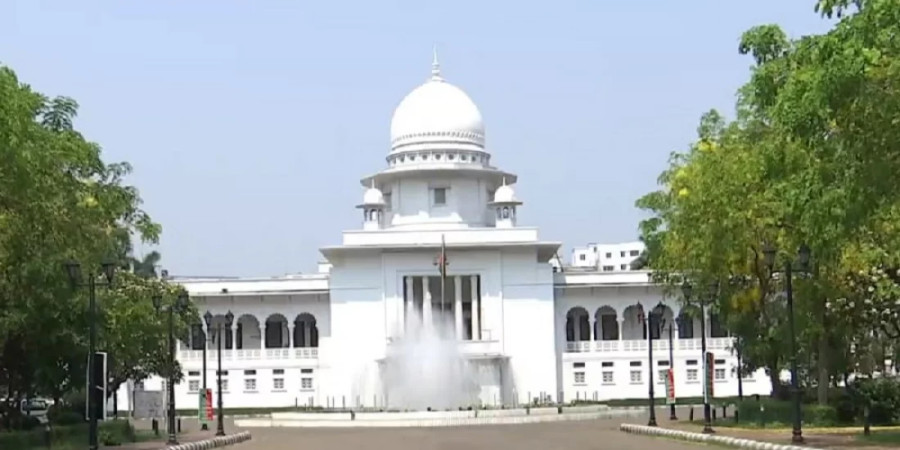
ছবি: Highcourt
In a shocking case of forgery, a group of brick kiln owners in Khagrachhari district has been accused of creating a fake court order to continue their illegal brick kiln operations, despite the High Court's directive not to allow it. The forged order, which misrepresented the original judgment of the High Court, came to light when it was presented as part of a legal document in an attempt to keep the kilns operational.
The issue began when several brick kiln owners in the district filed petitions with the High Court, seeking approval to continue their operations. The court, however, did not issue a directive allowing the continuation of the kilns, but instead, it ordered the Environmental Department and the local administration to resolve the requests for environmental clearance from the brick kiln owners.
However, in an apparent bid to bypass the court's original instructions, the owners allegedly created a forged order which stated that the High Court had allowed the production at the kilns to continue. The fake order also listed individuals who were not part of the original case as petitioners, and even altered the date of the order to give the impression that the court had authorized the continuation of the kilns.
The forgery was uncovered during a routine review by a division bench of the High Court, led by Justice Fatema Najib and Justice Shikdar Mahmudur Razi, on December 11. The bench, upon examining the matter, directed the Supreme Court's Registrar General to file criminal charges against those involved in the forgery.
The case traces back to a 2022 petition filed by the environmental and human rights organization, Human Rights and Peace for Bangladesh (HRPB), which sought to shut down illegal brick kiln operations across the three hilly districts of Khagrachhari, Bandarban, and Rangamati. On January 25, 2022, the High Court had ruled to close the illegal brick kilns and ordered the submission of a progress report regarding the implementation of this directive. Later, the brick kiln owners appealed to the Appellate Division, which partially modified the High Court's ruling, but upheld the main directive.
Recently, as part of the ongoing litigation, the petitioners in Khagrachhari reached out to the district administration, who informed them about receiving an order allegedly issued by the High Court permitting the brick kiln operations to continue. Upon reviewing the document, lawyer Monjil Morshed, representing the petitioners, grew suspicious. He found that the order stated December 2 as the date of the High Court's directive, but upon further investigation, the actual order from the High Court had been issued on November 26.
When the issue was brought to the attention of the High Court, it was revealed that no such directive had been given regarding the continuation of the brick kiln operations. Instead, the original order had instructed the Environmental Department and local authorities to process the applications for environmental clearances. The court's order did not permit the continuation of production at the kilns.
According to the information provided by the state counsel, two separate writ petitions were recently filed with the High Court, seeking permission to continue the brick kiln operations. The petitions had involved 32 petitioners, 16 in each case. After an initial hearing on November 26, the court issued an interim order, instructing the concerned authorities to process the applicants' environmental clearance within 60 days. The court also issued a rule asking why the applicants should not be granted licenses and environmental clearance for the operation of the kilns.
The forged order, however, stated that the High Court had allowed the continued operation of the kilns and had been altered to reflect a later date. The forged document also included additional petitioners who were not involved in the original case.
The issue was brought to light when Sajal Mallik, a lawyer representing the original petitioners, discovered the manipulation. Mallik confirmed that the petitioners had initially received a copy of the High Court’s ruling on December 1. However, upon further scrutiny, it became clear that the order had been tampered with to show a later date of December 2.
Speaking to the media, state lawyer Nur Mohammad Azmi confirmed that the forged order had attempted to mislead the authorities by showing false dates and names. He condemned the forgery as an attempt to misrepresent the court’s original order and circumvent the legal process. He stressed that such acts of forgery should not be tolerated and should be met with strict legal action.
The High Court has taken a serious view of the forgery and directed the Supreme Court’s Registrar General to initiate criminal proceedings against those involved in the act. The bench expressed surprise at how such a fraudulent attempt was made to manipulate the court’s order and called for swift action to uphold the integrity of the judicial system.
Lawyers involved in the case have expressed their astonishment at the extent to which such illegal activities were carried out, despite the clear directives of the court. They have also emphasized the importance of vigilance and transparency in legal proceedings to prevent similar occurrences in the future.
The incident has raised concerns about the illegal operation of brick kilns in the region, which has been a subject of environmental concern. The operations of these kilns have been linked to deforestation, air pollution, and other environmental hazards in the hilly districts of Khagrachhari, Bandarban, and Rangamati. Despite repeated court orders to halt these illegal activities, the case highlights the challenges faced by authorities in ensuring compliance with environmental laws.
As the matter progresses, it remains to be seen how the legal system will address the issue of illegal brick kiln operations and hold accountable those who resort to fraudulent practices to bypass the law. The High Court’s intervention in this case marks a significant step in upholding judicial integrity and ensuring that the rule of law is followed.
repoter






